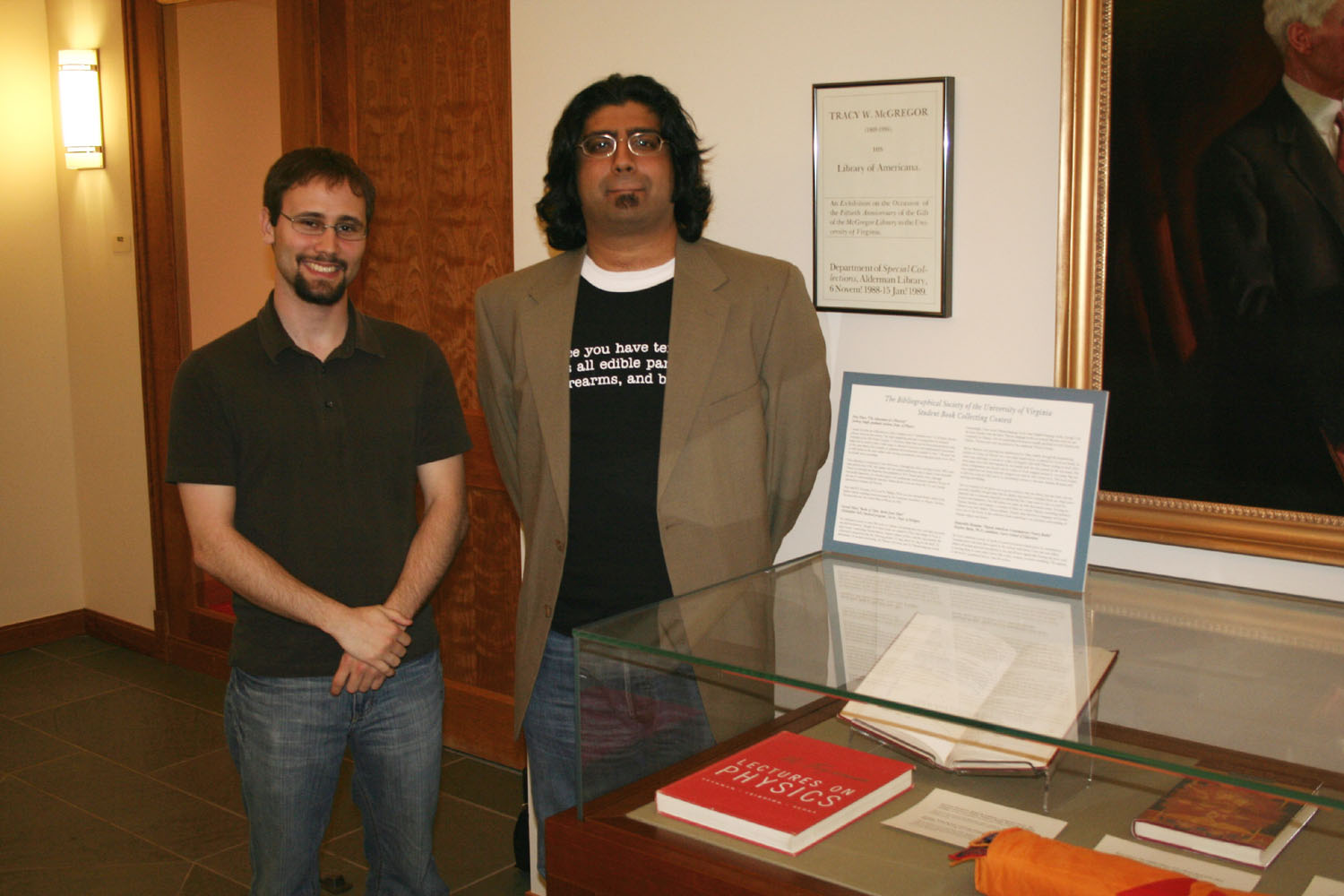April 14, 2008 — Jaideep Singh, a Ph.D candidate in the physics department at the University of Virginia, took his physics textbooks to the top of the pile in the book-collection competition sponsored by the Bibliographical Society of the University of Virginia.
Singh's collection, submitted as "The Education of a Physicist: A Collection of Physics Textbooks," emerged from a field of 10 competitors, ranging from a first-year student in the College of Arts & Sciences through students graduating this spring with doctoral degrees.
"The physics textbook collection was very extensive, covering complex areas of physics, and it contained some very rare items," said Anne Ribble, executive secretary of the Bibliographical Society. "According to John Scott, a distinguished nuclear physicist consulted by the judges, the entry really constituted an excellent bibliography of physics texts from around the world."
Singh, a 29-year-old San Diego resident, said he started collecting the books to help learn physics.
"I found that every book had its own strengths and weaknesses, so I kept on acquiring different books on the same subject," Singh said. "Eventually it got a little out of hand, and I was starting to look for books just to complete a set or to see how they changed from edition to edition."
Singh won $300 and a Bibliographical Society Rare Book School Fellowship.
"I had never seen a contest so precisely tuned to my interests and strengths," Singh said. "Only an idiot with over 300 physics books would pass this up."
Singh, who did his undergraduate work at California Institute of Technology, said he has an interest in how ideas change historically and found textbooks an ideal way to track these changes.
Singh's research focuses on using lasers and magnetic fields to magnetize helium-3 gas and using it for improved medical imaging, in collaboration with the radiology department in the School of Medicine. It can also be used for pure physics research.
Christopher Bell, who is in the doctoral program in the religious studies department, took second place with a collection titled "Books of Tibet, Books from Tibet," a collection of texts resulting from many miles of travel here and in Tibet.
Heather Burns, a Ph.D. candidate in the Curry School of Education, earned an honorable mention for her collection, "Signed Contemporary American Poetry Books."
The book-collecting contest "encourages reading and book collecting among the students," said Ribble. "It helps to promote the idea that gaining in-depth knowledge of a subject is valuable and rewards students for pursuing a passion in some field of intellectual endeavor."
Selections from all three winners' collections are on display in the downstairs lobby of the Mary and David Harrison Institute for American History, Literature and Culture / Albert and Shirley Small Special Collections Library through April.
The next book-collecting contest will be held in two years.
Singh's collection, submitted as "The Education of a Physicist: A Collection of Physics Textbooks," emerged from a field of 10 competitors, ranging from a first-year student in the College of Arts & Sciences through students graduating this spring with doctoral degrees.
"The physics textbook collection was very extensive, covering complex areas of physics, and it contained some very rare items," said Anne Ribble, executive secretary of the Bibliographical Society. "According to John Scott, a distinguished nuclear physicist consulted by the judges, the entry really constituted an excellent bibliography of physics texts from around the world."
Singh, a 29-year-old San Diego resident, said he started collecting the books to help learn physics.
"I found that every book had its own strengths and weaknesses, so I kept on acquiring different books on the same subject," Singh said. "Eventually it got a little out of hand, and I was starting to look for books just to complete a set or to see how they changed from edition to edition."
Singh won $300 and a Bibliographical Society Rare Book School Fellowship.
"I had never seen a contest so precisely tuned to my interests and strengths," Singh said. "Only an idiot with over 300 physics books would pass this up."
Singh, who did his undergraduate work at California Institute of Technology, said he has an interest in how ideas change historically and found textbooks an ideal way to track these changes.
Singh's research focuses on using lasers and magnetic fields to magnetize helium-3 gas and using it for improved medical imaging, in collaboration with the radiology department in the School of Medicine. It can also be used for pure physics research.
Christopher Bell, who is in the doctoral program in the religious studies department, took second place with a collection titled "Books of Tibet, Books from Tibet," a collection of texts resulting from many miles of travel here and in Tibet.
Heather Burns, a Ph.D. candidate in the Curry School of Education, earned an honorable mention for her collection, "Signed Contemporary American Poetry Books."
The book-collecting contest "encourages reading and book collecting among the students," said Ribble. "It helps to promote the idea that gaining in-depth knowledge of a subject is valuable and rewards students for pursuing a passion in some field of intellectual endeavor."
Selections from all three winners' collections are on display in the downstairs lobby of the Mary and David Harrison Institute for American History, Literature and Culture / Albert and Shirley Small Special Collections Library through April.
The next book-collecting contest will be held in two years.
Media Contact
Article Information
April 14, 2008
/content/physics-students-personal-library-wins-university-virginia-book-collecting-contest

